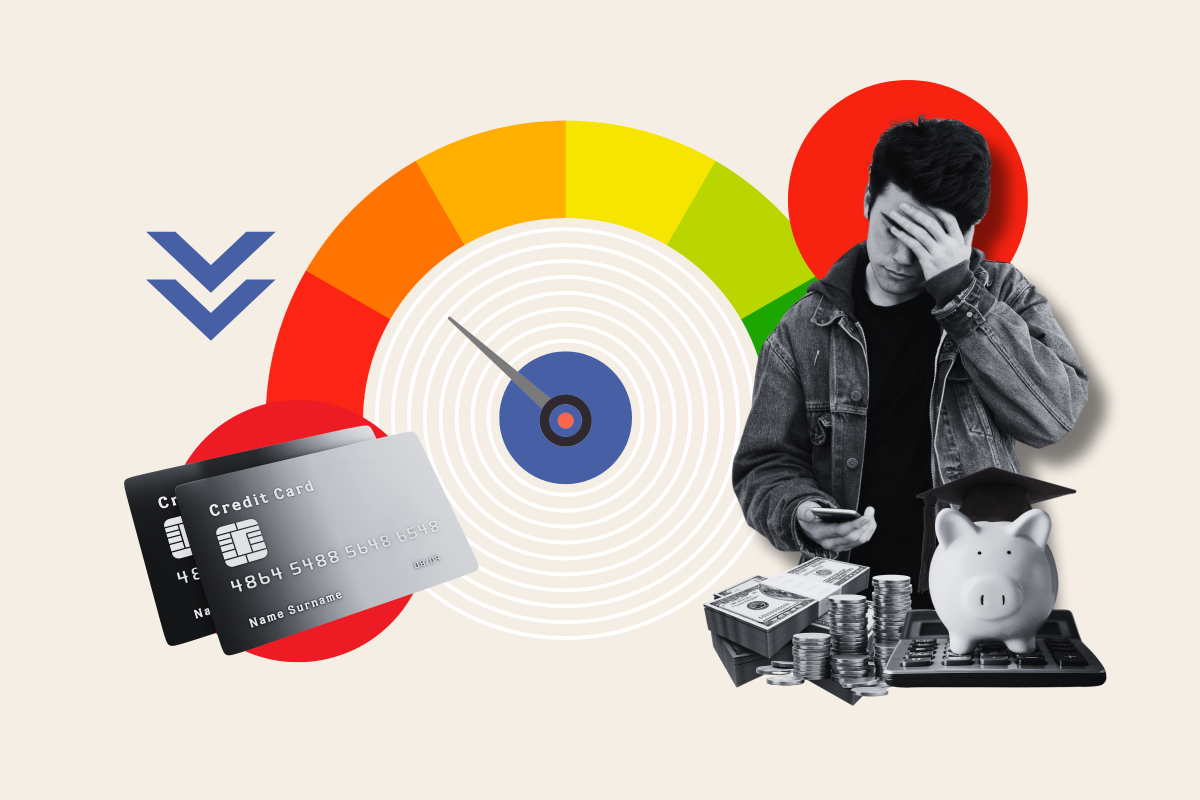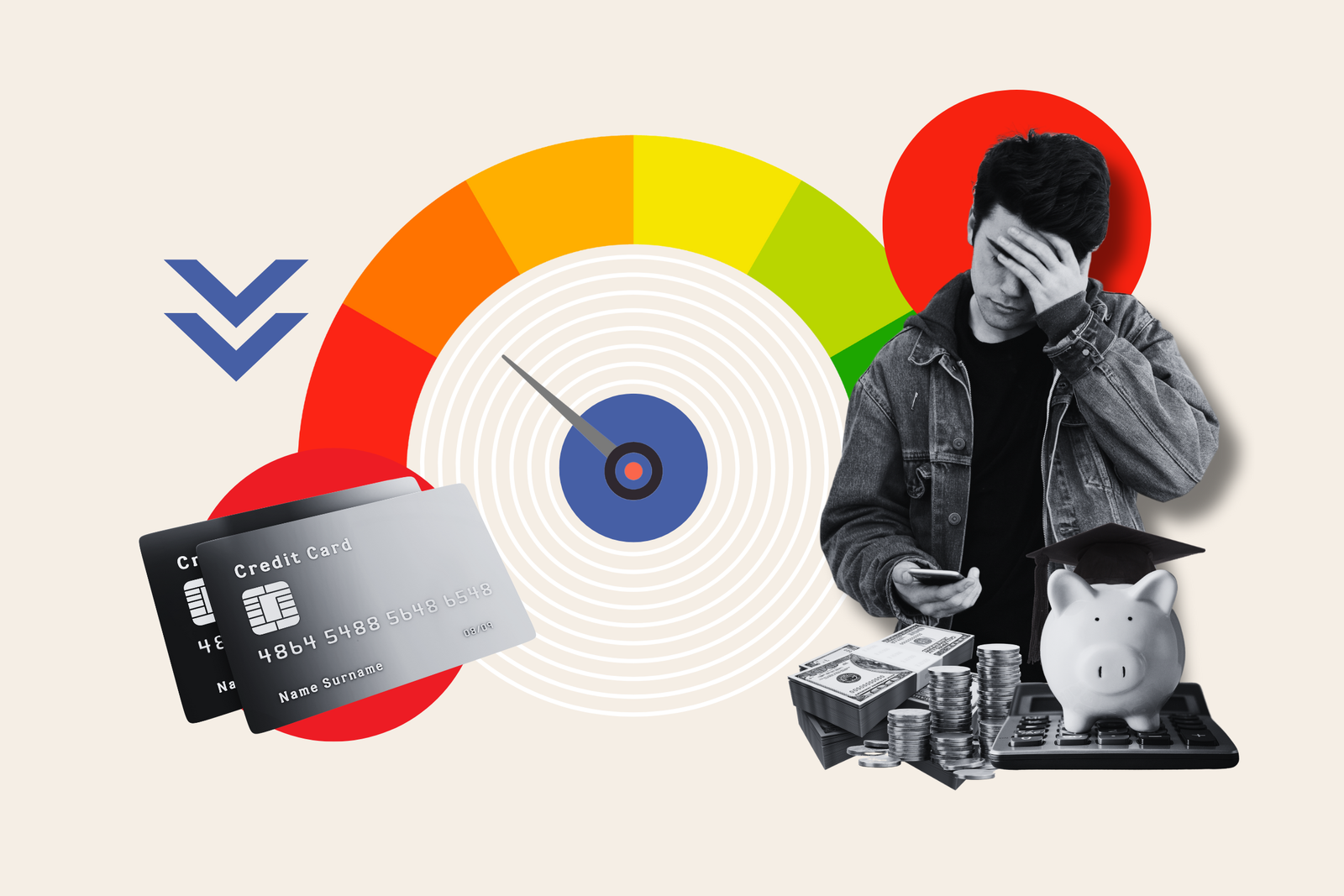Student loan borrowers are seeing their credit scores drop sharply after loan servicers began reporting delinquencies because of missed payments, several affected people told Newsweek.
They said they were unaware they had missed payments until they were notified by third-party agencies that their credit scores had dropped by as much as 200 points and are worried by what it may mean for their financial future.
Some said they had not received any communication from Nelnet, their loan servicer, that loan repayments had resumed or that they had payments that were past due. Others have shared similar experiences on social media in recent days, but it wasn’t immediately clear how many borrowers have been affected.
Newsweek has contacted Nelnet and the Department of Education (DOE) for comment via email.
Why It Matters
Credits scores are based on your credit history and range from 300 to 850. Factors that are frequently used to calculate it include bill payment history, length of credit history, current unpaid debt and if you have had debt sent to collection, foreclosure or a bankruptcy.
Credit scores above 670 are considered good and scores above 800 are considered excellent.
Your credit score helps lenders assess the likelihood that you will repay loans on time. It can determine whether you can get a credit card, buy a house, rent an apartment, start a business and more. A low score can lead to difficulty getting approved for loans or limit choices to those with unfavorable terms or higher interest rates.

Photo-illustration by Newsweek/Getty
What To Know
During President Donald Trump’s first term, student loan repayments were paused due to the COVID-19 pandemic in March 2020. President Joe Biden’s DOE implemented a 12-month “on-ramp” period when that pause ended in September 2024 to help borrowers who may struggle to make repayments avoid the consequences of missed or late payments, including the risk of defaulting and hurting their credit scores.
The Biden administration said it wouldn’t report borrowers who missed payments as delinquent to credit reporting agencies during that grace period. But since the “on-ramp” period ended on September 30, borrowers who don’t make payments on time again risk delinquency.
When payments haven’t been paid for three months, loan servicers notify credit reporting agencies that the loan is delinquent, affecting credit scores. When payments haven’t been made for nine months, the loan goes into default. Those who cannot afford payments can apply for deferment or forbearance, which pause payments, but interest will still accrue.
Those who haven’t made payments since the “on-ramp” period ended in late September are now seeing the impact as loan servicers like Nelnet have begun reporting delinquencies for borrowers who have not made payments for at least 90 days.
‘My Credit Is Ruined’
Roman Henry, a 31-year-old IT specialist based in Georgia, told Newsweek that he only learned his loans were serviced by Nelnet after receiving an email from Experian, a credit reporting agency, on Tuesday that told him his credit score had dropped from above 800 to 608. Henry said he immediately called Nelnet and his loans have been placed into forbearance.
“I will resume making payments in May 2025, and I have no issue paying moving forward,” he said. “The issue is now my credit is ruined. I had perfect credit, an 800+ score across all bureaus. My debt to income ratio is excellent, I have never missed a car loan payment, rent, utilities bill, credit card payment.”
Henry acknowledged that he should have stayed up to date with what was happening with his student loan payments, but is frustrated that he didn’t receive the required communication from Nelnet—including notifications when his payments were 30 and 60 days past due.
“After logging into Nelnet, my email on file was outdated, my mailing address was outdated as I have moved 6 times since 2020,” he said. “Looking back I did receive a couple of phone calls from what I now know to be Nelnet, but I never answered as I believe them to be one of the 10+ spam calls I receive daily.”
Taylor Scarborough, 27, of San Francisco, told Newsweek that she was first alerted that her loans were delinquent when her credit card company reduced her credit limit and she received an email from Credit Karma informing her that her credit score had dropped by more than 150 points.
“This was the first and only indication that something was wrong as Nelnet failed to tell me payments restarted OR provide a 30/60 day past due notice,” she said.
Scarborough said when she contacted Nelnet by phone this week, she was told she had been sent communications about her repayments. But she said she wasn’t sent any mail to her permanent address, where her parents live, and did not receive any emails or voicemails on her phone from Nelnet.
“Dealing with Nelnet’s mismanagement and the stress of an $18,000 loan—now inflated by interest that should never have accrued—has been overwhelming,” she said. “The financial burden alone is daunting, but the added frustration of navigating their poor communication, lack of accountability, and bureaucratic roadblocks has made it even worse. Instead of focusing on my future and financial stability, I’ve been forced to spend countless hours disputing charges that resulted from their negligence.”
Finith Jernigan, 39, of Wynnewood, Pennsylvania, told Newsweek that his credit score has dropped by about 130 points—and that he immediately made the payments he had missed when he received the emails about it from two credit reporting agencies.
There was “no warning or contact” from Nelnet, he said. “I assumed they would contact me when payments would restart, since the dates were extended multiple times over the pandemic. They had the wrong address, email, and phone number also from long ago. My correct address was on my credit report.”
Jernigan is especially frustrated because he said the only reason he hadn’t paid off his entire balance, despite being able to do so, was because he had been advised to make payments to build his credit.
Portia Shae, a 28-year-old who works in finance in New York, told Newsweek that her credit score dropped from 780 to 570 because she missed three $220 monthly payments.
She said she had not been making repayments for very long when the pandemic-era pause began and during the pause, her loans were transferred from Great Lakes to Nelnet without her knowing.
She had only ever been contacted by Nelnet on the phone and didn’t answer. “Nobody answers spam calls,” she said.
It was only after she saw her credit report that she used the federal Student Aid website to find out who her loan servicer is, and called Nelnet to put her account into forbearance. “I honestly still thought loans were in deferment with all the legislation going on. I had no clue I was past due,” she said.
What People Are Saying
Roman Henry told Newsweek: “There are so many people with excellent credit that have had their financial future destroyed instantly because of this mistake. This is a nightmare for many, who have been told these marks on our credit will stay on for seven years.”
Taylor Scarborough told Newsweekthat the drop in her credit score “has had an immediate and devastating impact on my financial stability. My credit limit was slashed by $8,000, limiting my ability to cover essential expenses.
“Looking ahead, I worry that this damage to my credit history will make it more difficult to qualify for a mortgage, secure favorable loan terms for a car, or even pass background checks for a new job. All of this stems from loan servicer negligence, not financial irresponsibility on my part, making it even more frustrating and unjust.”
Finith Jernigan told Newsweek: “I understand I made a mistake but my credit has now been destroyed by this and don’t think I would even qualify for any type of credit. Nelnet told me there was nothing they could or would do over the phone. I think the consequences of my mistake are pretty severe when this could have been resolved pretty quickly and easily.”
Portia Shae told Newsweek she feels “taken advantage of and victimized and now destroyed…Screw these loans and the government for using it as a political play piece these past five years and ultimately doing nothing to help, and now clearly destroying lives by the thousand by not being clear what payments resumed and the extremely swift and harsh punishment for being late.”
Alan Collinge, of Student Loan Justice, told Newsweek: “Over 80 percent of all borrowers are not making payments today, and this is likely to increase. We’ll see over half the borrowers in default in a year’s time. This lending program is no longer viable. Constitutional bankruptcy rights must be returned to the loans immediately to avoid the massive harms we’re already seeing, particularly in southern states like Texas, Florida, and Georgia, where student debt now exceeds the state budgets.”
Attorney Michael Lux, who founded The Student Loan Sherpa, warned of the risk of using the “on-ramp” period to delay making loan payments.
Lux previously told Newsweek: “Using the on-ramp as an excuse not to make payments is a bad idea for many borrowers…Put simply, the on-ramp exists so that mistakes don’t hurt too much. Using it as a snooze button to avoid the student loan restart could be a costly error.”
What Happens Next?
Borrowers who have seen their credit score drop significantly could have to wait some time to see improvement.
On its website, the Consumer Financial Protection Bureau (CFPB) offers some tips to help build a strong score including making payments on time, avoiding getting close to your credit limit, only applying for credit that is needed and fact-checking credit reports for errors.











